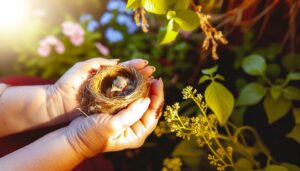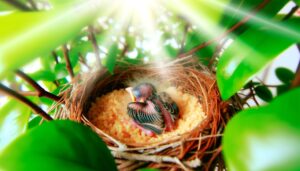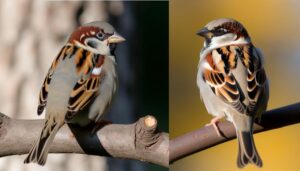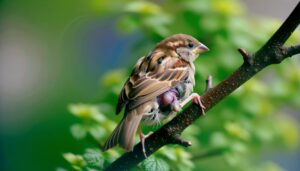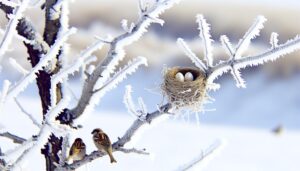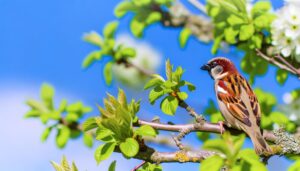5 Steps to Successfully Wean a Baby Sparrow
To wean a baby sparrow, first observe its ability to perch and peck at solid food. Guarantee it maintains balance and has developed muscle control.
Provide protein-rich insects, seeds like millet, and fresh fruits finely chopped and washed. Start changing by mixing seeds with soft food and gradually increasing solids.
Scatter seeds and insects to encourage foraging and introduce natural elements like twigs. Monitor its health closely by checking weight gain, droppings, and feather condition.
Regular water intake is essential. Consulting an avian veterinarian can offer more insights into maintaining your sparrow's health and progress.
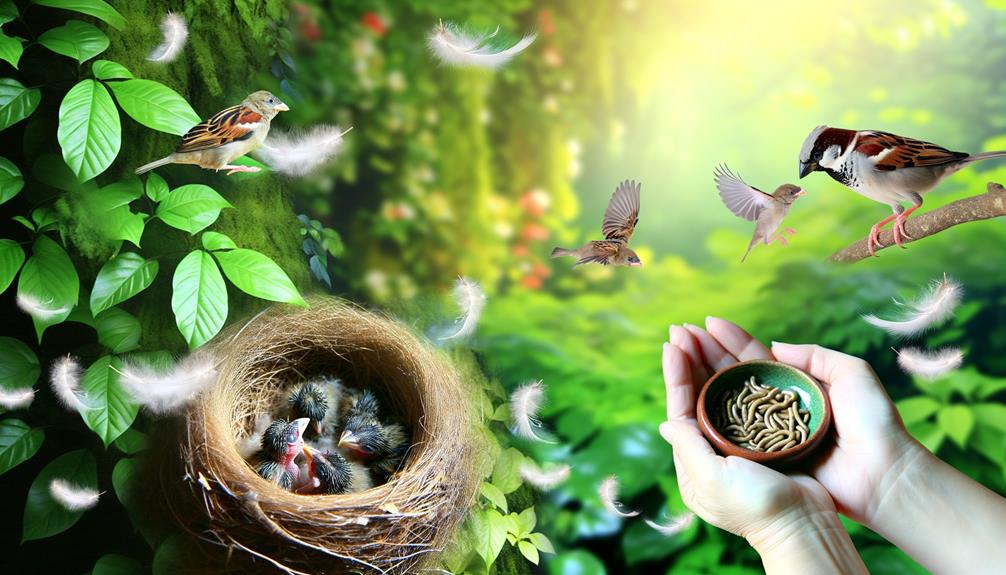
Key Takeaways
- Introduce millet and other easily digestible seeds mixed with soft food for a smooth transition to solids.
- Monitor the sparrow's ability to perch firmly and maintain balance as an indicator of readiness.
- Provide protein-rich insects like mealworms to ensure proper nutrition and muscle development.
- Encourage natural foraging by scattering seeds and insects in a safe environment for exploration.
- Regularly check weight, droppings, and feather condition to monitor health and consult an avian vet if necessary.
Assessing Readiness
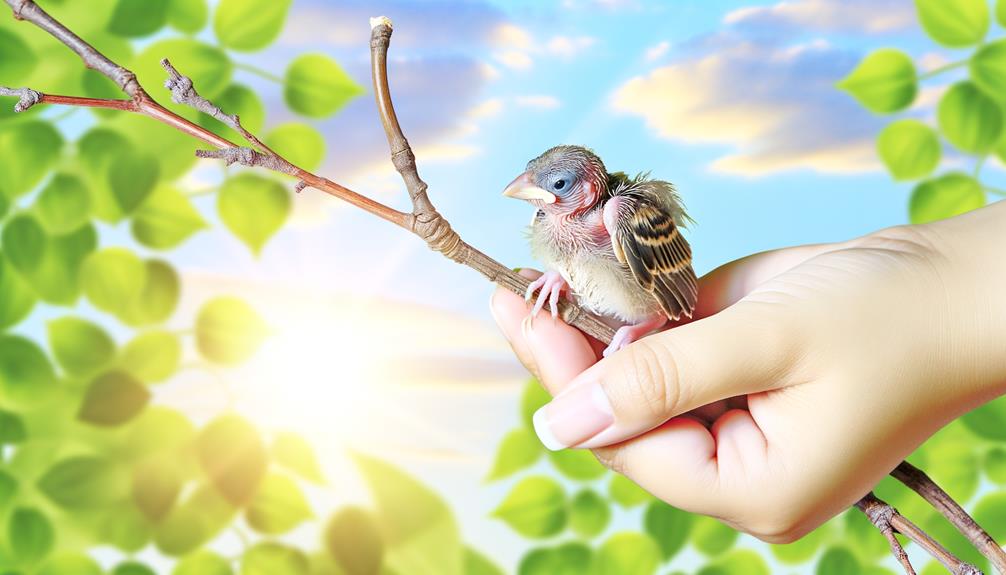
To assess if a baby sparrow is ready for weaning, observe its ability to perch firmly and peck at solid food. You'll want to see the sparrow maintaining balance on a perch without frequent slips or falls. Steadiness is vital as it indicates developing muscle control.
Next, monitor its interaction with solid food. The sparrow should show interest by pecking and attempting to eat small pieces of food. This behavior signifies that its beak and digestive system are adapting to more substantial nourishment. If these behaviors are consistent, the sparrow is likely ready to progress.
Always make sure the environment is safe and supportive, as your vigilant care can greatly impact its successful weaning process.
Preparing the Right Foods
When preparing the right foods for weaning a baby sparrow, make certain you provide a balanced mix of protein-rich insects, seeds, and fresh fruits to meet its nutritional needs.
Offer mealworms and crickets as they're excellent protein sources. For seeds, choose a mix of millet, sunflower seeds, and safflower seeds.
Incorporate finely chopped fresh fruits like apples and berries to supply essential vitamins. Make certain all food items are small enough for the sparrow to consume safely.
Always wash fruits thoroughly to remove pesticides. Additionally, provide a shallow dish of clean water for hydration.
Transitioning to Solids
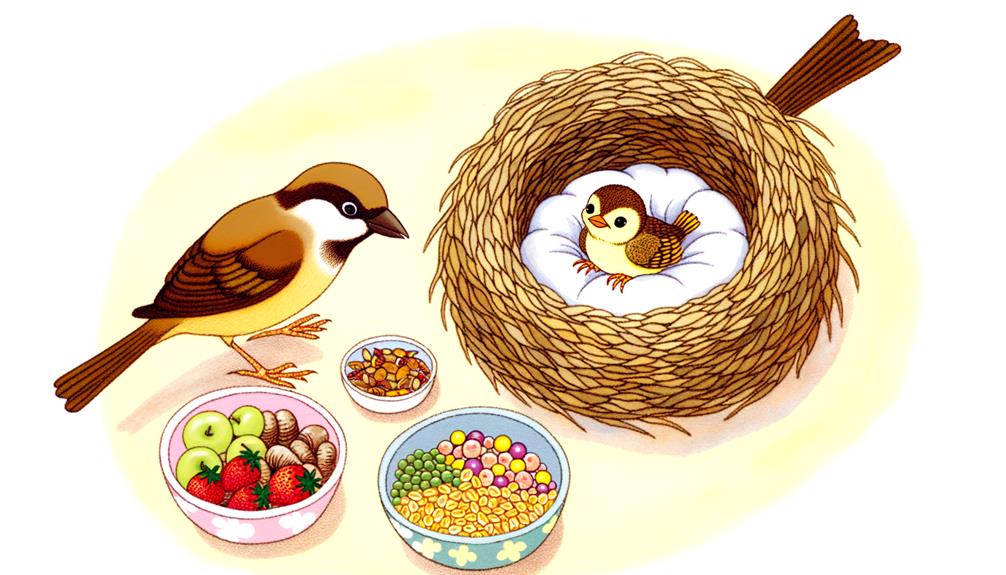
Gradually introducing solid foods is essential for shifting a baby sparrow from a soft diet to one that includes seeds and insects. Start by offering small, easily digestible seeds like millet and finely crushed sunflower seeds. Mix these with the soft food they're accustomed to, making sure a smooth change.
Monitor their eating habits closely, adjusting the ratio of solids to soft foods as they adapt.
Incorporate mealworms or other suitable insects to provide necessary protein. Guarantee the insects are small and manageable for the sparrow. Make sure fresh water is always available to aid digestion.
Keep the feeding environment clean to prevent contamination. By carefully balancing their diet and observing their progress, you'll support a healthy shift to solid foods.
Encouraging Foraging
Encouraging natural hunting instincts in a baby sparrow involves creating an environment rich with opportunities for exploration and discovery. Begin by scattering small amounts of seeds and insects in shallow dishes or on the ground. This mimics the hunting experience in the wild and promotes instinctual pecking behaviors.
Introduce a variety of natural elements, like twigs and leaves, to stimulate curiosity and interaction. Gradually reduce the frequency of hand-feeding to promote independence.
Guarantee the hunting area is safe and closely monitored to prevent accidental ingestion of harmful items. By fostering these behaviors, you'll help the sparrow develop essential survival skills, ensuring a smoother shift to self-sufficiency in its natural habitat.
Monitoring Health and Progress
As you encourage the baby sparrow to forage, closely monitor its health and progress to guarantee successful maturation.
Observe its weight daily using a precise scale. A steady weight gain indicates proper nutrition.
Check its droppings for consistency and color, as abnormal feces can signal digestive issues.
Examine its feathers for growth and condition; healthy plumage reflects adequate nutrient intake.
Watch for signs of distress or lethargy, which may indicate underlying health problems.
Guarantee it's drinking water regularly to stay hydrated.
Record all observations in a journal to track patterns and changes over time.
If any concerns arise, consult an avian veterinarian promptly.
Your diligence safeguards the sparrow's well-being and smooth progression to independence.
Conclusion
By following these steps, you'll guarantee a smooth weaning process for your baby sparrow.
Did you know that about 70% of hand-reared sparrows successfully adapt to foraging when properly shifted? This statistic highlights the importance of patience and diligence.
Always monitor your sparrow's health and progress closely, making modifications as needed.
Your careful attention to detail can make a significant difference in their growth and overall well-being.
Good luck with your feathered friend!

